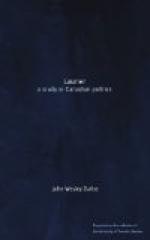a common crown.” He was equally explicit
two years later when, addressing the Ontario club
in Toronto, he said: “We are under the
suzerainty of the King of England. We are his
loyal subjects. We bow the knee to him.
But the King of England has no more rights over us
than are allowed him by our own Canadian parliament.
If this is not a nation, what then is a nation?”
Laurier looked forward to the complete enfranchisement
of Canada as a nation under the British Crown, with
a status of complete equality with Great Britain in
the British family. A keen-witted member of the
Imperial Conference of 1911, Sir John G. Findlay,
Attorney-General for New Zealand, saw the reality
behind the anomalous position which Sir Wilfrid held.
“I recognized,” he says, “that Canadian
nationalism is beginning to resent even the appearance—the
constitutional forms—of a sub-ordination
to the Mother country.” “And,”
he added, revealing the clarity of his understanding,
“this is not a desire for separation.”
But it was not in London that the question of Imperial
relationships presented its most thorny aspect.
Laurier could maintain there a stand-pat, blocking
attitude with no more disagreeable consequences than
perhaps a little social chilliness, the symbolical
“gracious duchess” showing a touch of hauteur
and disappointment. It was in the reactions of
the issue upon Canadian politics that Laurier met
with his real difficulties. He could not, by
tactics of procrastination or evasion, keep the question
out of the domestic field; the era of abject, passive
and unthinking colonialism was beginning to pass;
and the spirit of nationalism was stirring the sluggish
waters of Canadian politics. Sir Wilfrid had
to face the issue and make the best of it. He
handled the question with consummate adroitness and
judgment; but ultimately its complexities baffled
him and the Imperialists who wanted everything done
for the Empire and the so-called “Nationalists”
of Quebec, who wanted nothing done, joined forces
against him.
THE CANADIAN IMPERIALISTS
It was the Imperialists in the old country and in
Canada who gave the issue no rest; they believed,
apparently with good reason, that a little urgency
was all that was needed to make Canada the very forefront
of the drive for the consolidation of the Empire.
The English-speaking Canadians were traditionally
and aggressively British. The basic population
in the English provinces was United Empire Loyalist,
which absorbed and colored all later accretions from
the Motherland—an immigration which in its
earlier stages was also largely militarist following
the reduction of the army establishment upon the conclusion
of the Napoleonic wars. It was inspired with
a traditional hostility to the American republic.
The hereditary devotion to the British Crown, of which
Victoria to the passing generations appeared to be
the permanent and unchanging personification, threw
into eclipse the corresponding sentiment in England.
English-speaking Canadians were more British than the
British; they were more loyal than the Queen.
One can get an admirable idea of the state of Ontario
feeling in the addresses at the various U.E.
L. celebrations in the year 1884; in both its resentments
and its affections there was something childish and
confiding.




